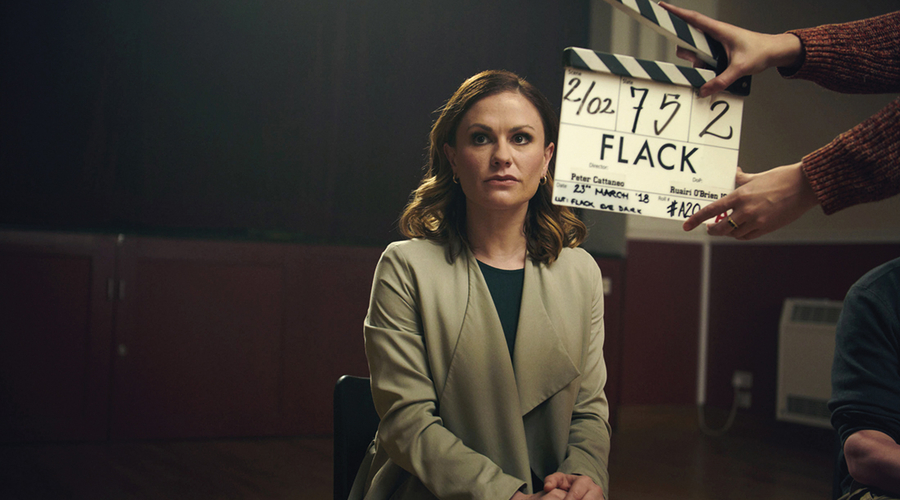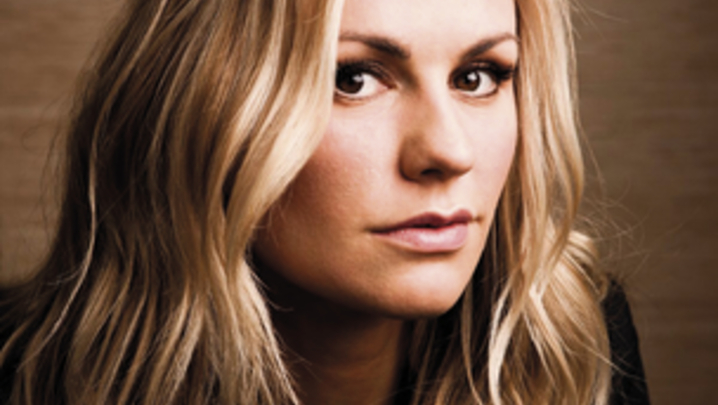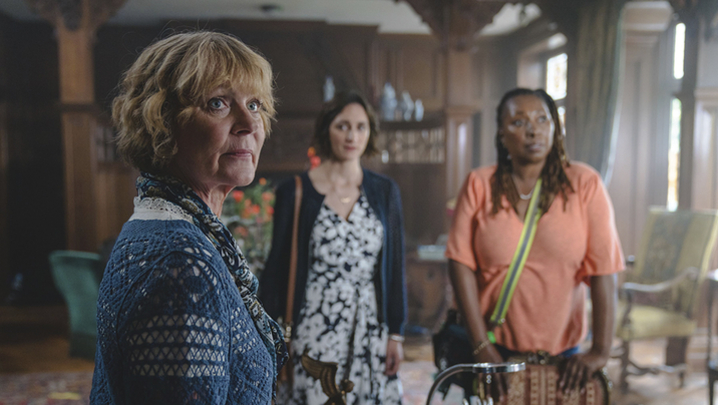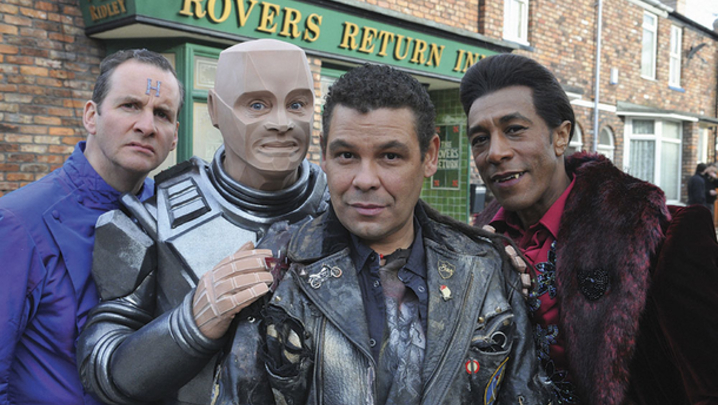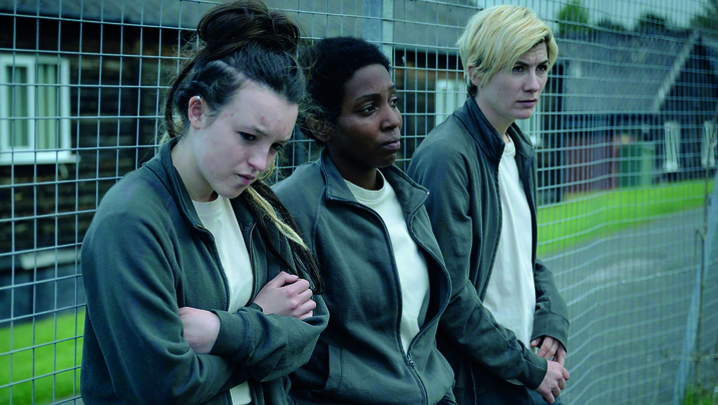Flack’s creator was determined to write a series about a complicated woman, hears Steve Clarke
GQ magazine described the new Anna Paquin drama, Flack, as “so terrible it might just be unmissable”. The verdict of the Daily Telegraph’s TV critic was “sharp and whizzy”, while the Observer hailed it as a “terrific and bittersweet comedy”, “in turns woefully tender and snort-funny”. Whatever you think of the female-skewing Flack, one thing is clear: it’s not a show to ignore.
This must be a huge relief to UKTV – Flack was made for its W channel – and to the writer of the programme, Oliver Lansley. He toiled for seven long years to get it on to TV, he revealed during an RTS Futures panel discussion that was preceded by a screening of episode 1.
By the way, the RTS audience loved the section they saw of what is unquestionably a highly entertaining, glossy, zeitgeisty series.
TV dramas featuring strong, complicated female characters are all the rage: just think of such era-defining pieces as Fleabag and Killing Eve.
In Flack, Paquin plays Robyn, a smart, scheming, self-destructive PR (she snorts coke like Keith Richards once did), trying to pull herself together after her mother’s suicide. In the debut episode, she saves the reputation of a gay Premier League footballer who’s picked up a rent boy, and a sex-crazed TV chef.
The idea for Flack was conceived by Lansley as a response to several high-profile dramas based around complicated men – think Tony Soprano and Walter White.
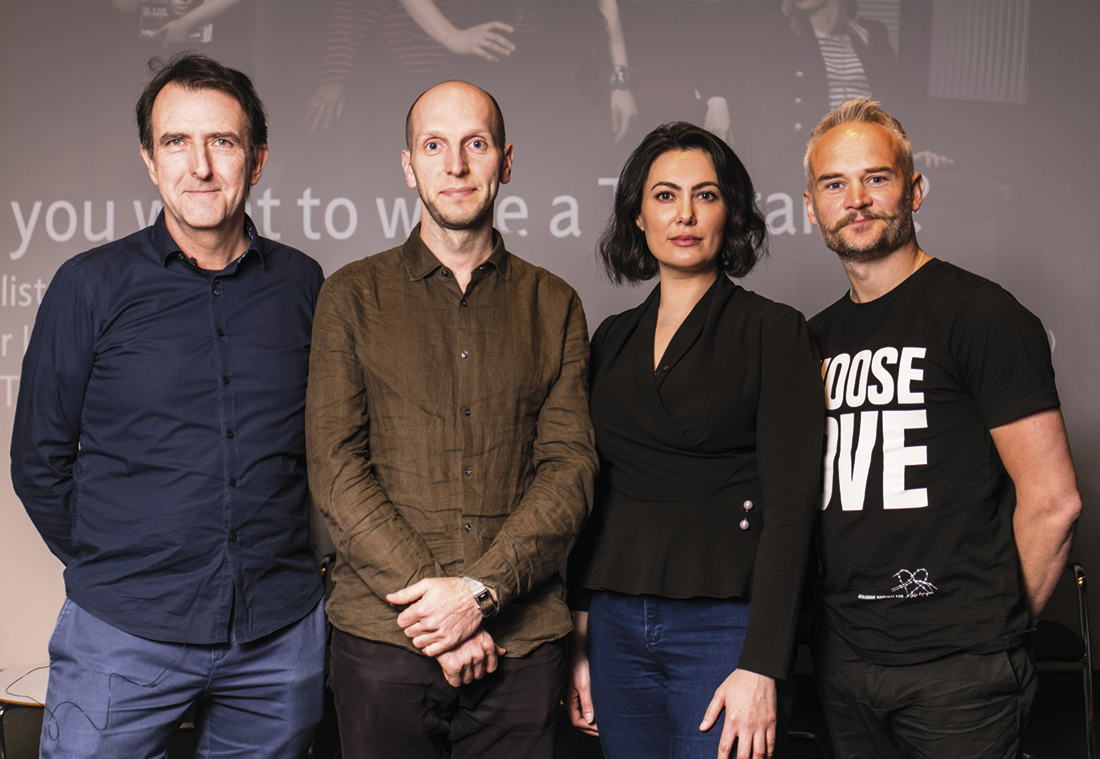
Lansley told the RTS audience that he wanted to write a show featuring a complicated woman: “Five years ago, a book came out about the golden age of television called Difficult Men. It focused on showrunners and leading men such as Tony Soprano, Walter White and Don Draper.
“They were complex, male protagonists. I wanted to write a female character who could be on the cover of a book called Difficult Women.
“We’ve come on a lot since then but, at the time, if female characters were complicated they were often apologising for themselves or they were over-explained.
“By contrast, male characters do what they do. They’d be mysterious and interesting because of it.”
Lansley’s setting for his show was the world of public relations, celebrity and media. “I thought it was quite a fun world to play in,” he said.
He had experienced this part of celebrity culture when, as an actor, he played the late DJ and TV presenter Kenny Everett, in a BBC Four biopic. Lansley was the focus of the film’s PR campaign.
“I was given this lovely lady PR. That was the first time I saw how it worked,” he recalled. “I was fascinated by it. We think of PR as Ab Fab, white wine and air kissing, but it always struck me as a more robust world than that.”
He added: “My reference for Flack was always The Thick of It, but with glossy magazines.”
Ironically, given its complex journey, the show got off to a racing start. Within six months of being commissioned by an unidentified British broadcaster, a pilot episode was in the can. So were six scripts.
But the show was then summarily dropped. At this stage, Flack was a half-hour comedy and none of the four stars cast in W’s series were yet cast – Paquin, Rebecca Benson, Sophie Okonedo and Lydia Wilson.
Subsequently, the series morphed into a one-hour drama before becoming the show that ended up on W – a 45-minute comedy drama (excluding commercial breaks) that premiered in February.
“I don’t think Flack’s gestation is typical,” said Mark Talbot, head of comedy development at producer Hat Trick. “It’s not the way that most shows get made.”
Hat Trick had taken the show to its US agents after the series was dropped in the UK. It was in the States that Anna Paquin got involved. More development work was undertaken, this time for a US company. Again, the programme was rejected.
Undaunted, its creators returned to the UK, where, eventually, it was successfully pitched to UKTV’s head of scripted, Pete Thornton. “He loved it and he had all six scripts to read, which worked in our favour,” said Talbot. “Although UKTV had come on board, we needed extra financing. We took it back to the US and pitched it to some American channels. Pop said yes.”
The green light was given in November 2017 – seven years after the lunch where the idea was first discussed. Filming commenced in January 2018.
"Some broadcasters might have gone, “Oh no, we can’t do drug taking”"
“Flack felt spot on for W,” said Thornton, who had been at UKTV for only six months. “At the time, I was not thinking of making a drama, but W is aimed at career women, metropolitan thirtysomethings.
“Some broadcasters might have gone, ‘Oh no, we can’t do drug taking.’ For us, as long as it was justified and felt like it was properly integrated, we thought this was something that felt very real. People do talk like that and behave in that way some of the time,” he said to audience laughter.
“The hybrid version that we ended up with was perfect,” said Lansley. “The show embraces both the worlds of English and American celebrity. We jump between the two.”
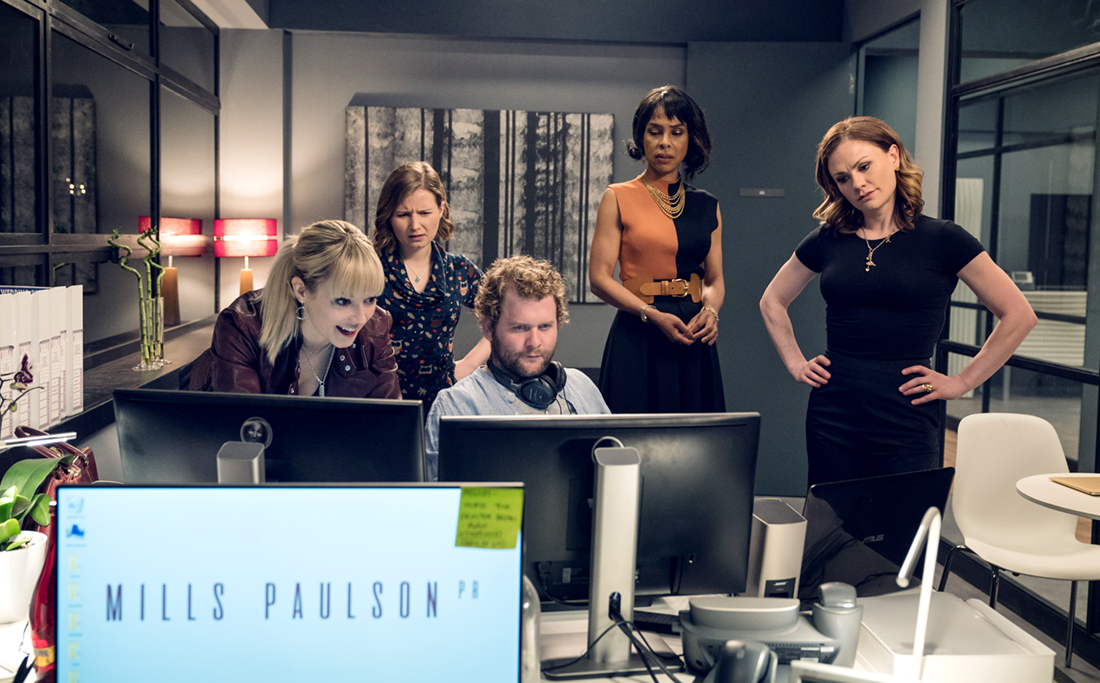
He described the process of having the show rejected so many times by different broadcasters as “devastating”. “If you write, you develop a relationship with the characters you’ve created. To have this whole series sitting there was devastating. It’s very hard to carry around all these characters in your head.”
Ultimately, however, the longer Flack was worked on, the better it got. “Personally, I think we’ve ended up with the best version of both the earlier versions,” said Talbot. Lansley agreed: “We’ve made a much better show because of the journey we went on.”
The RTS Flack screening and script writing Q&A was held at the London Transport Museum in Covent Garden on 19 February. The session was chaired by journalist Emma Cox and produced by UKTV’s Ali Laurie and Gem Pinkney.
The pitch: time to tell your story
Mark Talbot, head of comedy development at Hat Trick, said: ‘When I go in and pitch a show, I always try and tell a story and explain why it’s relevant to what’s going on today. Talking about difficult women is a good way into a pitch.
‘If you’re an established writer who has written nine series of Peep Show, you can probably go in and pitch a show without any script or any treatment and they’re still likely to commission you. But if you’re newer and haven’t had anything on TV, a channel will need to know that you can definitely write.
‘You’ll need to have a script. Channels will want a sample script and a treatment.
‘If you are newer, I would just write a script. That makes it easier for me to sell you.
‘If I think a script is brilliant, I’ll believe in it for seven years.’
The treatment: hard graft
Pete Thornton, UKTV’s head of scripted, said: ‘Writing treatments is really hard. This is comedy drama but, particularly for comedy, a treatment is a hard ask.
‘You’re never going to set out your world in a couple of pages. The aim is to be informative, be brief and, at the same time, hilarious.’
He added: ‘Writing a treatment involves a hell of a lot of work and you’re normally paid 10% of your script fee for it, which is not very much.
‘There’s a paragraph on all the characters, an episode outline and, maybe, some examples of dialogue. It’s probably a week’s work.’
Oliver Lansley suggested that it was ‘really easy to write a treatment about a big idea. You can write it in a page.…[But] the best shows are not based on one-line ideas. They’re much, much bigger. I hate treatments. I would rather write a script than a treatment and it would probably take me as long.…
‘It’s always so reductive. If you describe a character in two lines they’re bound to sound awful....
‘A treatment is a document to make someone want to know more. If you go into a room and start telling a story and they want more of the story, you’ve got a good chance.’
The notes: how to cope
Oliver Lansley described the experience of working with two channels and umpteen executive producers who constantly sent him notes on his scripts.
‘If every one was a knife in your side, you’d bleed to death very quickly,’ he said. ‘You have to be able to see through the notes to what helps the script.
‘Sometimes, you’ll get a note and it’s not necessarily a great note, but it will identify something that needs changing.
‘Early on in the process, there is this resistance and defensiveness against it.
‘You think, “I’ve written this and this is how it’s going to be.” You’ve got to let go of that and use the notes to your advantage.
‘You need to find that central line in yourself to go, “Yeah, OK, that can be better.” But you’ve got to pick your battles and be as objective about it as you can.
‘You do have to get used to it because, if you want to write for telly, you are going to get a lot
of notes.’
Yasmine Akram, also a writer on Flack, added: ‘It’s exactly that – don’t take it personally. If there’s a specific note on the dialogue, I’ll take it on.…
‘It’s a weird thing, as a comedy writer, you assume that people understand the musicality of comedy and that they’ll know how to use the joke.
‘It’s weird to watch when an actor doesn’t get it.’

